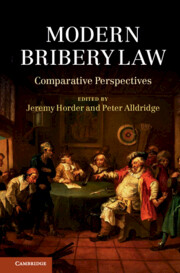Book contents
- Frontmatter
- Contents
- List of contributors
- Table of cases
- Table of statutes and international instruments
- Introduction
- Part I Bribery law: between public wrongdoing and private advantage-taking
- Part II Bribery without borders: tackling corruption in the EU and beyond
- Part III Ill-gotten gains: the challenge of prosecution, enforcement and asset recovery
- 8 Bribery and the changing pattern of criminal prosecution
- 9 Bribery and corruption: the UK framework for enforcement
- 10 Prosecuting bribery in Hong Kong's human rights environment
- 11 Is the UNCAC an effective deterrent to grand corruption?
- Bibliography
- Index
10 - Prosecuting bribery in Hong Kong's human rights environment
from Part III - Ill-gotten gains: the challenge of prosecution, enforcement and asset recovery
Published online by Cambridge University Press: 05 May 2013
- Frontmatter
- Contents
- List of contributors
- Table of cases
- Table of statutes and international instruments
- Introduction
- Part I Bribery law: between public wrongdoing and private advantage-taking
- Part II Bribery without borders: tackling corruption in the EU and beyond
- Part III Ill-gotten gains: the challenge of prosecution, enforcement and asset recovery
- 8 Bribery and the changing pattern of criminal prosecution
- 9 Bribery and corruption: the UK framework for enforcement
- 10 Prosecuting bribery in Hong Kong's human rights environment
- 11 Is the UNCAC an effective deterrent to grand corruption?
- Bibliography
- Index
Summary
Introduction
Hong Kong was one of the earliest common law jurisdictions to enact comprehensive modern bribery laws. For this reason alone, it was surprising that the Law Commission's reports on bribery did not refer to the Hong Kong experience. The omission is likely explained by aspects of Hong Kong's bribery laws, which the Law Commission refrained from adopting, such as the agent–principal paradigm and separation of public and private bribery. This chapter will not try to defend a superior Hong Kong approach to substantive law. Instead, it will focus on enforcing bribery laws, a topic which was not given special attention in the Bribery Act 2010. Hong Kong has close to forty years of experience in enforcing anti-corruption laws, including two decades of enforcement in a human rights environment with an entrenched bill of rights, robust independent judiciary and increasingly open society.
Established in 1974, Hong Kong's Independent Commission Against Corruption (ICAC) is regarded as one of the world's most successful anti-corruption agencies. It cured the serious ills of public corruption that had plagued Hong Kong society for decades up to the early 1980s. It is seen as a leader in interdicting corruption in the private sector. Its greatest impact has probably come from its far-reaching educational and prevention work, giving it a ubiquitous presence in the community from kindergarten classrooms to prime-time television to corporate boardrooms. As part of the 1997 resumption of sovereignty, it was given a special protected status in Hong Kong's constitution, the Basic Law.
- Type
- Chapter
- Information
- Modern Bribery LawComparative Perspectives, pp. 267 - 292Publisher: Cambridge University PressPrint publication year: 2013
- 1
- Cited by



